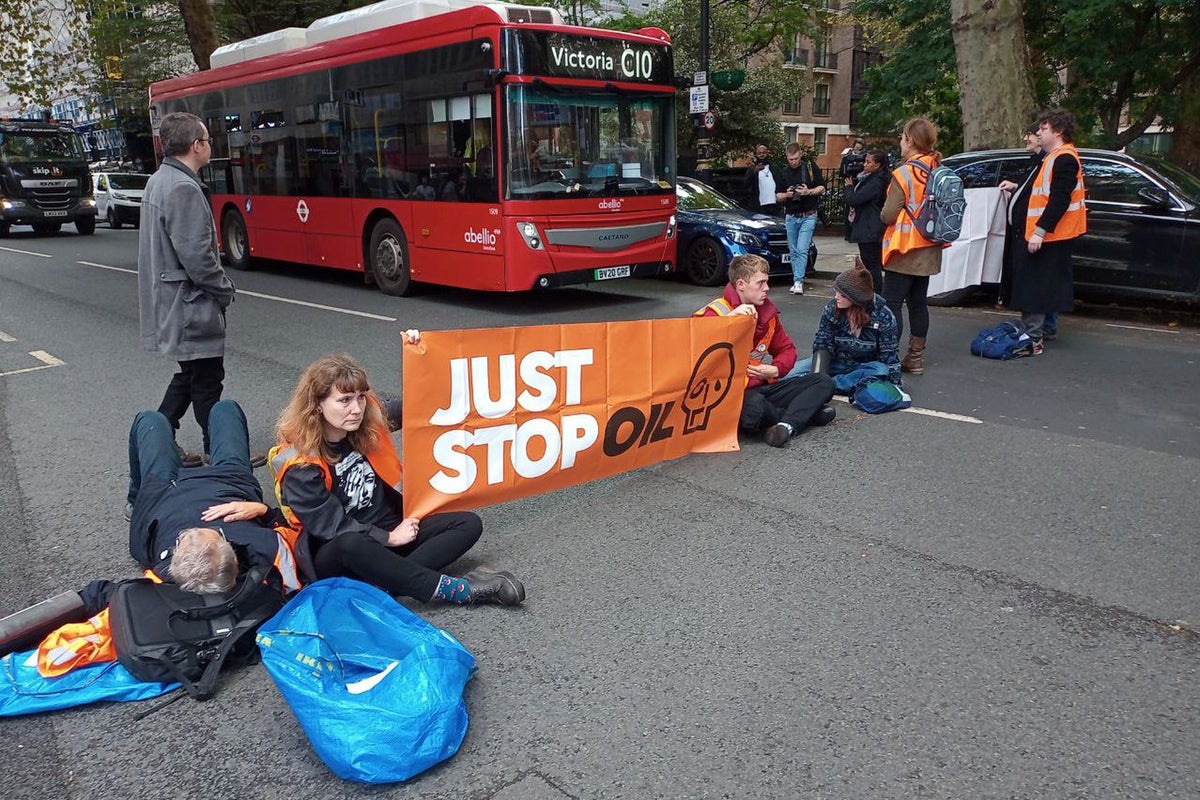For free real time breaking news alerts sent straight to your inbox sign up to our breaking news emails
Sign up to our free breaking news emails
Police could be allowed to intervene before protests become highly disruptive, under new measures set to be considered in Parliament, the Government has confirmed.
An amendment to the Public Order Bill, due to be introduced on Monday, will aim to give police greater clarity about when they can intervene to stop demonstrators blocking roads or slow marching.
The Bill is aimed at curbing the guerrilla tactics used by groups such as Insulate Britain and Extinction Rebellion.
The proposals, backed by prime minister Rishi Sunak, come after police chiefs claimed there is some uncertainty over what can be currently classed as “serious disruption” under existing law.
According to Downing Street, under the proposed changes, police would not need to wait for disruption to take place and could shut demonstrations down before they escalate.
Human rights group Liberty said the plan amounted to an attack on the right to protest.
Recommended
- New protest laws ‘go too far’ and are not needed, police commissioners say
- New protest bill will deepen racial inequality, campaigners warn Boris Johnson
- Policing Bill: MPs vote for ‘draconian’ protest laws despite mounting opposition
- Extinction Rebellion confirm shift away from ‘disruption’ tactics in response to losing public support
Director Martha Spurrier said: “These new proposals should be seen for what they are: a desperate attempt to shut down any route for ordinary people to make their voices heard.
“Allowing the police to shut down protests before any disruption has taken place simply on the off-chance that it might sets a dangerous precedent, not to mention making the job of officers policing protests much more complex.”
No 10 said police, as part of the mooted changes, would not need to treat a series of protests by the same group as standalone incidents, but would be able to consider their total impact.
Officers would be able to take into consideration long-running campaigns designed to cause repeat disruption over a period of days or weeks.
Giving his support to the measures, Mr Sunak said: “The right to protest is a fundamental principle of our democracy, but this is not absolute.
A balance must be struck between the rights of individuals and the rights of the hard-working majority to go about their day-to-day business
Prime Minister Rishi Sunak
“A balance must be struck between the rights of individuals and the rights of the hard-working majority to go about their day-to-day business.”
The prime minister added: “We cannot have protests conducted by a small minority disrupting the lives of the ordinary public. It’s not acceptable and we’re going to bring it to an end.
“The police asked us for more clarity to crack down on these guerrilla tactics, and we have listened.”
Metropolitan Police Commissioner Sir Mark Rowley also gave his backing to the proposals, which would broaden the legal definition of serious disruption.
“It is clearly understood that everybody has the right to protest,” he said. “Increasingly, however, police are getting drawn into complex legal arguments about the balance between that right to protest and the rights of others to go about their daily lives free from serious disruption.
“The lack of clarity in the legislation and the increasing complexity of the case law is making this more difficult and more contested.”
I welcome the Government’s proposal to introduce a legal definition of 'serious disruption' and 'reasonable excuse'
Metropolitan Police Commissioner Sir Mark Rowley
Sir Mark added: “It is for Parliament to decide the law, and, along with other police chiefs, I made the case for a clearer legal framework in relation to protest, obstruction and public nuisance laws.
“We have not sought any new powers to curtail or constrain protest, but have asked for legal clarity about where the balance of rights should be struck.
“I welcome the government’s proposal to introduce a legal definition of ‘serious disruption’ and ‘reasonable excuse’.
“In practical terms, Parliament providing such clarity will create a clearer line for the police to enforce when protests impact upon others who simply wish to go about their lawful business.”
The Public Order Bill is considered a successor to the controversial Police, Crime, Sentencing and Courts Act passed last year, which was criticised for introducing curbs on the right to protest.
The Bill is currently undergoing line-by-line scrutiny in the House of Lords, which will be tasked with debating the amendment.
MPs previously backed a cross-party amendment to the Bill aimed at setting up buffer zones around abortion clinics, in a bid to offer greater protection to women by preventing protesters from gathering.
Sarah Jones, Labour’s shadow policing minister, said: “The police have powers to deal with dangerous, disruptive protests and Labour backs them to use those powers.
“But the Prime Minister has spent more time talking about protest than he has the epidemic of violence against women and girls or his Government’s shameful record prosecuting criminals.
“If he’s going to do the Home Secretary’s job for her, the victims being let down by his government would appreciate the same attention being given to them.”
✕
Subscribe to Independent Premium to bookmark this article
Want to bookmark your favourite articles and stories to read or reference later? Start your Independent Premium subscription today.
SubscribeAlready subscribed? Log in
Popular videos
{{/link}}

